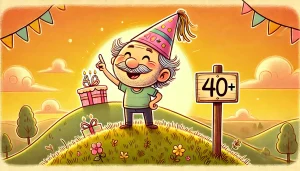Ever wondered why people laugh when they say you’re “over the hill” at birthday parties?
Past one’s prime or youth; beyond the peak of one’s abilities or vitality, often used humorously to refer to someone who has reached middle age or beyond.
Mastering English idioms can transform your language skills from basic to truly fluent. “Over the hill” is one of those colorful expressions that might confuse you if taken literally.

But don’t worry! This playful phrase about life’s journey has a simple metaphor at its heart—imagine climbing up life’s hill to your peak years, then starting the descent.
Understanding this idiom will add both depth and humor to your English conversations.
Exploring the Meaning
“Over the hill” is generally used to describe someone who is considered past their prime.
It suggests that once you’ve reached the figurative top of life’s hill, you begin the descent, which represents moving beyond your peak years.
Below are key insights into the idiom:
- Definition
The phrase implies that a person is no longer at the pinnacle of their abilities or vitality.
It often appears as a lighthearted way of saying someone has entered a later phase of life, though it doesn’t necessarily mean they’re incapable or lacking energy. - Visual Metaphor
Think of a hill as a life journey.
Ascending is the climb toward success or the prime of your abilities, while reaching the top and going down the other side signifies passing your peak. - A Note on Usage
It’s commonly used jokingly or casually.
However, some might perceive it as negative if used insensitively, so it’s wise to consider the context and the listener’s feelings.
Birthday Mix-Up Tale
A friend once shared a story about being told he was “over the hill” at a birthday celebration.
He was thrilled, believing it meant he had become wiser and more experienced, without realizing his friends were poking fun at the idea that he was getting older.
When he finally found out they were teasing him about his age, the misunderstanding led to lots of laughter. He decided to take it in stride, embracing the joke instead of letting it bring him down.
Practical Examples
Idioms become much easier to grasp when you see them in real-life contexts. Here are a few scenarios where “over the hill” might appear:
- Workplace Setting
“He joked he was over the hill, but everyone knows he’s still a top performer on the team.”
In this context, “over the hill” is used humorously, highlighting the person’s continued excellence despite any worries about fading abilities.
- Social Gatherings
“Someone teased her that she was over the hill, but she simply laughed and said she was more energetic than ever.”
Here, the idiom underscores a playful jab at perceived age, met with a confident response.
- Everyday Conversation
“I don’t believe I’m over the hill yet. I’m still learning new skills and enjoying every moment.”
This example shows a person rejecting the idea that they’re past their best, emphasizing an eagerness to keep growing.
Roots & Culture
The exact origins of “over the hill” are somewhat unclear, though many believe it stems from the notion of life as a single, large climb.
Once you reach the peak, you head down the other side, symbolizing the transition from youth to more advanced stages.
Some people associate the phrase with the 20th century, when it might have been jokingly applied to anyone who seemed to have passed a pivotal point.
Despite its lighthearted use, cultural perceptions vary. In certain traditions, reaching a particular milestone might be celebrated with humor related to going “over the hill,” complete with decorated cakes and humorous cards.
In others, it can be taken more seriously, highlighting an important passage of life. Adapting to these nuances can help you use the idiom effectively and politely when speaking with people from various backgrounds.
Shift in My View
A friend named John once felt discouraged when he heard someone describe him as “over the hill.” Initially, he thought it implied a swift decline in his capabilities.
After reflecting and talking to people who cared about him, he came to see that this phrase can be flipped into a positive viewpoint.
He decided to prove that being “over the hill” simply meant he had enough experience to tackle new challenges without hesitation.
He started a new hobby, learned fresh skills, and found renewed passion in his daily routine.
Before long, he was sharing success stories that illustrated how a phrase designed to poke fun at age was actually fueling his motivation.
Funny Fails & Examples
Here are a few example sentences, along with light-hearted scenarios that might arise if someone takes the idiom too literally:
- “I’m not worried about being called over the hill. I plan to learn something new every day.”
- Humorous Scenario: A literal-minded listener might wonder if you have to climb a certain hill at a certain age, imagining a hidden peak you must cross once you reach a particular stage in life.
- Humorous Scenario: A literal-minded listener might wonder if you have to climb a certain hill at a certain age, imagining a hidden peak you must cross once you reach a particular stage in life.
- “My friend keeps saying I’m over the hill, but I just enrolled in a dance class to prove otherwise.”
- Humorous Scenario: Someone might ask if the dance studio is located ‘over the hill,’ implying an actual geographical location.
- Humorous Scenario: Someone might ask if the dance studio is located ‘over the hill,’ implying an actual geographical location.
- “Some insist that after a certain point, you’re over the hill, yet I’ve never felt more energetic.”
- Humorous Scenario: Picture someone genuinely asking, “Which hill are we talking about, exactly? A mountain range?”
Each of these examples highlights how the idiom can be used either self-mockingly or as a mild tease. Understanding the intention behind the words is key to communicating effectively.
Similar & Opposite
Broadening your idiomatic vocabulary helps enrich conversation. When discussing “over the hill,” consider these related expressions:
Similar Expressions
- Past your prime
Usage: Often implies someone’s best years are behind them.
Example: “He feels he’s past his prime, but he keeps surprising everyone with his creativity.” - Long in the tooth
Usage: A slightly humorous or old-fashioned way of saying someone is older.
Example: “They joked he was long in the tooth, but he’s still the life of the party.” - In your twilight years
Usage: Highlights a later phase of life.
Example: “Some say she’s in her twilight years, yet she’s busier than most people around her.” - Golden years
Usage: Reflects a period often associated with relaxation and enjoyment.
Example: “He calls these his golden years, filled with travel and leisure.”
Opposite Expression
- In your prime
Usage: Conveys that someone is at the height of their powers or abilities.
Example: “Even though he’s in his prime, he respects the experience of those he admires.”
Related Idiom
Another common idiom worth exploring is “kick the bucket.” Though it sounds odd, it’s a euphemistic way to say “die.”
- Meaning
It implies the end of someone’s life, but is often used humorously or casually, reducing the grimness of the topic. - Anecdote
Someone once overheard a person say, “I still have so much on my bucket list before I kick the bucket.”
The listener innocently asked, “Why would you kick a bucket to complete your list?”
This confusion turned into a memorable lesson on idiomatic language. - Note
Some say the origin could stem from standing on a bucket during one’s final moments, then kicking it away.
However, there are alternate theories involving old-English terms or practical references to rural practices.
Regardless, it remains one of the most recognized euphemisms for death in everyday speech. - Example Sentence
“He wants to visit every continent before he kicks the bucket.”
The phrase implies a desire to accomplish major goals in life, adding a bit of humor to a serious subject.
Sarah Breaks the Mold
Sarah felt discouraged when she heard people teasing that she was “over the hill,” implying she had passed her best days. Instead of giving up, she turned the phrase on its head.
She reminded herself that life can be just as exhilarating after reaching a certain milestone. She enrolled in new courses, visited places she’d only dreamed of, and immersed herself in activities that sparked her excitement.
The moment she decided to defy the label was the moment she rediscovered her self-confidence. By reframing the phrase in a positive light, she proved that “over the hill” could simply mean starting a new chapter.
Example Sentences
Below are final samples to help you master the idiom “over the hill.” Notice how each example uses it in a slightly different way:
- “I refuse to believe I’m over the hill, because every day brings a chance to learn.”
- “He got a cake shaped like a mountain at his party, complete with a sign that said ‘Over the Hill.’”
- “Some people tease me about being over the hill, but they can’t keep up when we go hiking.”
- “Being over the hill just means I have a broader perspective on things.”
- “They said she was over the hill, yet she ran a marathon faster than people half her age.”
Use these sentences in your own practice to get comfortable with the phrase. Try sharing them in a casual chat or writing them in a journal, and see how well they fit natural conversation.
Pop Quiz: Check Your Idiom Skills
Over the Hill

Summary
“Over the hill” is an English idiom that refers to someone who has passed their prime or youth.
It uses the metaphor of life as a hill – climbing represents the growth period, the peak symbolizes one’s prime, and the downward slope represents the declining phase.
This idiom is typically used in the following ways:
- Humorously at birthday celebrations
- As light-hearted teasing about age
- Not necessarily with negative connotations, but sometimes to acknowledge someone’s wealth of experience
Understanding idioms like “over the hill” enriches your English conversations and helps you grasp cultural nuances.
When you can recognize age-related jokes and even laugh at yourself occasionally, your communication in English becomes more natural and authentic.



Remember that while this expression might seem to focus on aging, many people use it playfully or even transform its meaning into motivation for new beginnings.









Comment